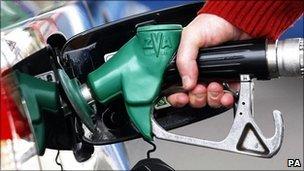Warning over VAT rise impact on Scots rural fuel prices
- Published

This time last year, petrol was priced on average at 107.74p a litre and diesel at 109.46p
There have been renewed calls for the UK government to include rural areas of Scotland in a pilot project to reduce fuel prices.
It comes as the cost of petrol and diesel increased across Scotland as VAT went up to 20% at midnight.
Fuel duty rose on 1 January, and the AA estimated the two rises would add about 3.5p to a litre of petrol and diesel.
Prices in Scotland's remote areas will be even higher, with fuel now costing £1.45 a litre or more in some parts.
The average price of a litre of unleaded stands at £1.24, while diesel costs, on average, £1.28 a litre.
But the Western Isles MP, the SNP's Angus MacNeil, said people in the Highlands and Islands would be hardest hit by the price rises.
"Before the election there was talk of a fair fuel regulator, which would mean when there were spikes in oil prices the duty would go down," he said.
"We've seen none of that yet, so in this new year I'm calling for the government to honour their promises.
"The last time fuel prices were as high as this many people came to me, worried about their commute to work and what it might mean for their jobs, their take-home pay and disposable income.
"So this is going to start to bite and to bite quite hard."
In Lerwick, Shetland, prices reached 140.9p per litre for petrol and 143.9p for diesel. Prices in rural parts of Shetland were reported to be even higher.
A Scottish government spokesman described the VAT hike as "damaging to consumers and the wider economy".
He said the Scottish Parliament should have responsibility for such powers.
However, Chancellor George Osborne has argued the increase was needed to cut the deficit.
- Published3 January 2011
- Published1 January 2011
- Published17 December 2010